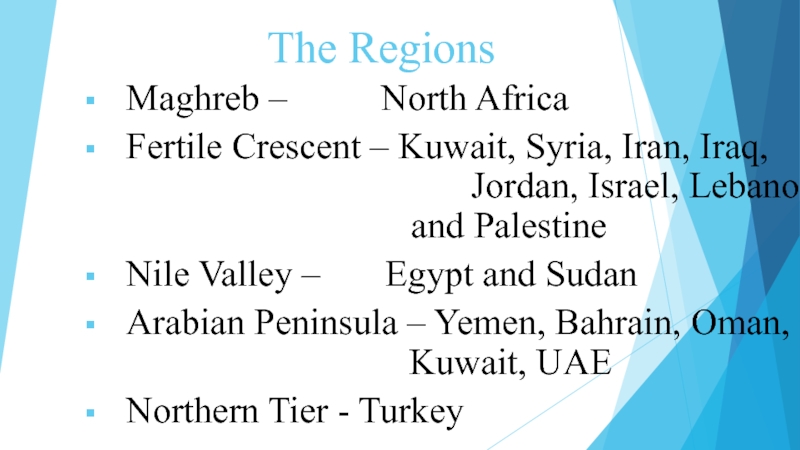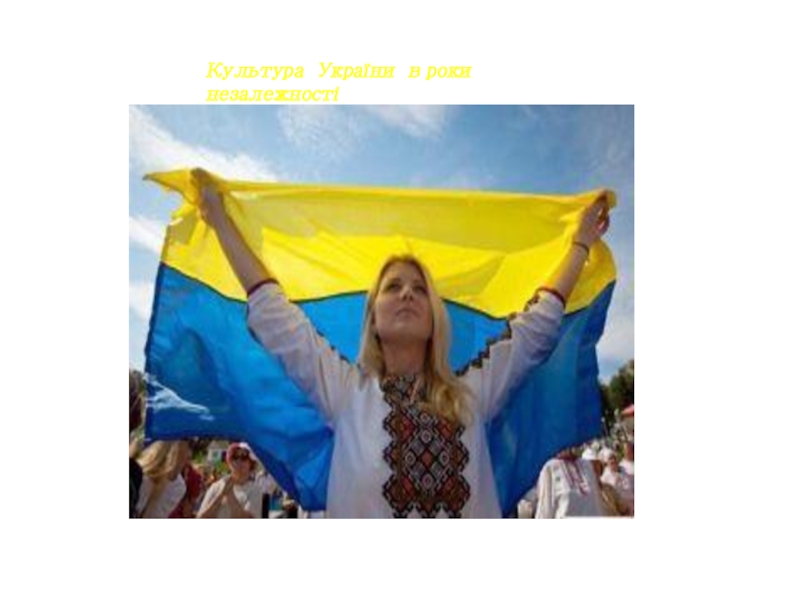- Главная
- Разное
- Дизайн
- Бизнес и предпринимательство
- Аналитика
- Образование
- Развлечения
- Красота и здоровье
- Финансы
- Государство
- Путешествия
- Спорт
- Недвижимость
- Армия
- Графика
- Культурология
- Еда и кулинария
- Лингвистика
- Английский язык
- Астрономия
- Алгебра
- Биология
- География
- Детские презентации
- Информатика
- История
- Литература
- Маркетинг
- Математика
- Медицина
- Менеджмент
- Музыка
- МХК
- Немецкий язык
- ОБЖ
- Обществознание
- Окружающий мир
- Педагогика
- Русский язык
- Технология
- Физика
- Философия
- Химия
- Шаблоны, картинки для презентаций
- Экология
- Экономика
- Юриспруденция
The middle east. Religion and ethnic groups презентация
Содержание
Слайд 3The Regions
Maghreb – North Africa
Fertile Crescent – Kuwait, Syria, Iran, Iraq,
Jordan, Israel, Lebanon, and Palestine
Nile Valley – Egypt and Sudan
Arabian Peninsula – Yemen, Bahrain, Oman, Kuwait, UAE
Northern Tier - Turkey
Nile Valley – Egypt and Sudan
Arabian Peninsula – Yemen, Bahrain, Oman, Kuwait, UAE
Northern Tier - Turkey
Слайд 4Religious and Cultural Traits
The Middle East is divided into various ethnic
and religious sects (Durham 43).
The ethnic groups are Arabs, Persians, Kurds, and Turks among other sub-tribes.
The religions include Judaism, Islam (Sunni and Shiite), Christianity, Ibadism, Zoroastrianism, and Druze among others (Held 120).
The ethnic groups are Arabs, Persians, Kurds, and Turks among other sub-tribes.
The religions include Judaism, Islam (Sunni and Shiite), Christianity, Ibadism, Zoroastrianism, and Druze among others (Held 120).
Слайд 5Cultural Formation
Sunni Islam is the religion with the most followers; the
faith is mainly practiced in Saudi Arabia, North Africa, the UAE, and Yemen.
In Iran and Jordan as well as parts of Lebanon, Shia Muslims dominate
Judaism is mainly practiced in Israel.
In Syria, Alawites form the majority.
Iraq has a mixed religious identity of Shia and Sunni, which is responsible for the sectarian wars in the country.
In Turkey, Christianity and Islam are widely practiced.
In Iran and Jordan as well as parts of Lebanon, Shia Muslims dominate
Judaism is mainly practiced in Israel.
In Syria, Alawites form the majority.
Iraq has a mixed religious identity of Shia and Sunni, which is responsible for the sectarian wars in the country.
In Turkey, Christianity and Islam are widely practiced.
Слайд 6Ethnic Formation
In the North African Maghreb region, the main cultural
activity is pastoralism and nomadism in addition to practicing Sunni Islam (Anderson, Seibert and Wagner 12).
In the Fertile Crescent and the Nile Valley are Arabs, Jews, Kurds, and mixed races, who practice arable agriculture and practice Judaism, Islam and Christianity.
In the Arab Peninsula and the Northern Tier, trading and oil are the main economic activity (Louise 54).
In the Fertile Crescent and the Nile Valley are Arabs, Jews, Kurds, and mixed races, who practice arable agriculture and practice Judaism, Islam and Christianity.
In the Arab Peninsula and the Northern Tier, trading and oil are the main economic activity (Louise 54).
Слайд 7Works Cited
Anderson, R., R. Seibert and J. Wagner. Politics and Change
in the Middle East (8th ed.). Prentice-Hall, 2006. Print.
Durham, Cole. Islam, Europe and Emerging Legal Issues. New York: Ashgate. 2012. Print.
Held, Colbert C. Middle East Patterns: Places, Peoples, and Politics. Fourth Edition. London: Westview Press, 2006. Print.
Louise, Fawcett. International Relations of the Middle East. New York: Oxford University Press, 2005. Print.
Durham, Cole. Islam, Europe and Emerging Legal Issues. New York: Ashgate. 2012. Print.
Held, Colbert C. Middle East Patterns: Places, Peoples, and Politics. Fourth Edition. London: Westview Press, 2006. Print.
Louise, Fawcett. International Relations of the Middle East. New York: Oxford University Press, 2005. Print.












